Kretzschmar Group
Adult Stem Cell Niches in Cancer
Adult stem cells — the cells that maintain and regenerate tissues in our body — reside in a specialised microenvironment termed the stem cell niche. While stem cell niches are tissue-specific, two cellular components — fibroblasts and immune cells — have emerged as prominent niche members across the body. Stem cells receive cues from their microenvironment to control a smooth transition between various plastic states, which are crucial for maintaining tissue homeostasis and regenerating in response to injury. Conversely, in diseases such as cancer, aberrant (stem) cells can acquire the ability to remodel their microenvironment, allowing for the progression of disease.
We aim to decipher the crosstalk between stem/tumour cells and their microenvironment using the epithelia of the head and neck region and digestive tract as model systems. To unravel the fundamental mechanisms underlying tissue homeostasis and tumorigenesis, we apply organoid technology, immune/stromal cell–organoid co-cultures, 3D whole-mount imaging, and single-cell and spatial transcriptomics, utilising both animal models and patient material. Our ultimate goal is to leverage this communication to enhance the therapeutic treatments for patients with head and neck cancer and colorectal cancer.
Select publications
ORIGINAL RESEARCH ARTICLES, RESOURCES, PROTOCOLS AND PRE-PRINTS
Establishment and Characterization of Patient-Derived Oral Cancer Organoids. Harnischfeger N*, Szabo L* & Kretzschmar K#. Methods Mol Biol. 2025. Published ahead of print on 09/01/2025. https://doi.org/10.1007/7651_2024_594.
The Immunoregulatory Architecture of the Adult Oral Cavity. Matuck BF, Huynh K, Pereira D, Zhang X, Kunz M, Kumar N, Easter QT, Fernandes A, Ghodke A, Predus A, Szabó L, Harnischfeger N, Khavandgar Z, Beach M, Perez P, Nilges B, Moreno M, Ko K, Teichmann S, Kimple A, Pringle S, Kretzschmar K, Warner BM, Sequeira I#, Liu J# & Byrd KM#. biorxiv. Pre-print published on 03/12/2024. https://doi.org/10.1101/2024.12.01.626279.
Spatial transcriptomics reveals molecular cues underlying the site specificity of the adult mouse oral mucosa and its stem cell niches. Seubert AC, Krafft M, Bopp S, Helal M, Bhandare P, Wolf E, Alemany A, Riedel A & Kretzschmar K#. Stem Cell Reports. 2024 Dec 10;19(12):1706-1719. https://doi.org/10.1016/j.stemcr.2024.10.007.
Uncovering the mode of action of engineered T cells in patient cancer organoids. Dekkers JF, Alieva M, Cleven A, Keramati F, Wezenaar AKL, van Vliet EJ, Puschhof J, Brazda P, Johanna I, Meringa AD, Rebel HG, Buchholz MB, Barrera Román M, Zeeman AL, de Blank S, Fasci D, Geurts MH, Cornel AM, Driehuis E, Millen R, Straetemans T, Nicolasen MJT, Aarts-Riemens T, Ariese HCR, Johnson HR, van Ineveld RL, Karaiskaki F, Kopper O, Bar-Ephraim YE, Kretzschmar K, Eggermont AMM, Nierkens S, Wehrens EJ, Stunnenberg HG, Clevers H#, Kuball J#, Sebestyen Z# & Rios AC#. Nat Biotechnol. 2023 Jan;41(1):60-69. https://doi.org/10.1038/s41587-022-01397-w.
Troy/Tnfrsf19 marks epidermal cells that govern interfollicular epidermal renewal and cornification. Kretzschmar K*,#, Boonekamp KE*, Bleijs M, Asra P, Koomen M, Chuva de Sousa Lopes SM, Giovannone B & Clevers H#. Stem Cell Reports. 2021 Sep 14;16(9):2379-2394. https://doi.org/10.1016/j.stemcr.2021.07.007.
Generation and Characterization of Murine Oral Mucosal Organoid Cultures. Seubert AC, Krafft M & Kretzschmar K#. J Vis Exp. 2021 Jul 31;(173). https://dx.doi.org/10.3791/62529.
Establishment of patient-derived cancer organoids for drug-screening applications. Driehuis E, Kretzschmar K# & Clevers H#. Nat Protoc. 2020 Oct;15(10):3380-3409. https://doi.org/10.1038/s41596-020-0379-4.
REVIEW ARTICLES
Modelling adult stem cells and their niche in health and disease with epithelial organoids. Szabó L*, Seubert AC* & Kretzschmar K#. Semin Cell Dev Biol. 2023 Jul 30;144:20-30. https://doi.org/10.1016/j.semcdb.2022.09.006.
A Roadmap for the Human Oral and Craniofacial Cell Atlas. Caetano AJ, Human Cell Atlas Oral and Craniofacial Bionetwork (incl. Kretzschmar K), Sequeira I# & Byrd KM#. Journal of Dental Research. 2022 Oct; 101(11):1274-1288. https://doi.org/10.1177/00220345221110768.
Cancer research using organoid technology. Kretzschmar K. J Mol Med (Berl). 2021 Apr;99(4):501-515. https://doi.org/10.1007/s00109-020-01990-z.
Organoids in immunological research. Bar-Ephraim YE*, Kretzschmar K* & Clevers H. Nat Rev Immunol. 2020 May;20(5):279-293. https://doi.org/10.1038/s41577-019-0248-y.
Lineage tracing. Kretzschmar K & Watt FM. Cell. 2012 Jan 20;148(1-2):33-45. https://doi.org/10.1016/j.cell.2012.01.002.
(*shared first authors, #co-corresponding authors)
Impressions of our research
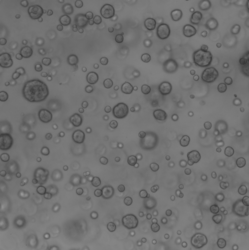
Kai Kretzschmar
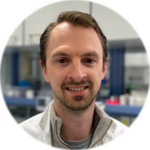
Junior Group Leader
Kai received his PhD degree in genetics from the University of Cambridge (UK) in 2014. During his PhD research with Prof. Fiona M. Watt, Kai investigated epidermal stem cells and their niche. He then joined the group of Prof. Hans Clevers at the Hubrecht Institute in Utrecht (NL). There, he mapped cardiac regeneration on the single-cell level, developed new epithelial organoid models and discovered a new epidermal stem cell population marked by Troy/Tnfrsf19. Since 2020, Kai has been a Junior Group Leader at the MSNZ Würzburg, funded by the German Cancer Aid. In 2022, he received a prestigious European Research Council Starting Grant to fund his research and expand his research team.
Throughout his career, Kai has received multiple awards and honours, among them the 2015 Nikon Young Scientist Award of the German Society for Cell Biology, long-term fellowships from HFSP and EMBO, as well as a VENI talent award (ZonMW/NWO). Since 2023, Kai has been an Early Career Editor at Stem Cell Reports, the scientific journal of the International Society for Stem Cell Research (ISSCR).
Alex Esteban Barroso
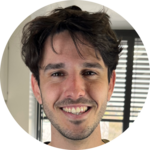
PhD Student
Alex received his bachelor's degree in Biotechnology from the Polytechnic University of Madrid and he completed his master's studies in the field of Immunology at the Complutense University of Madrid in 2022. In March 2023, he started his PhD in the Kretzschmar group.
Alex's PhD project focuses on deciphering the homeostasis of oral mucosal tissue, cancer, and regeneration.
Alex's project is funded by the European Union/ERC.
Amelie Glöckler

MSc Student
Nadja Harnischfeger
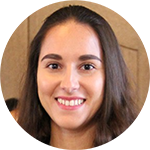
PhD Student
After obtaining her bachelor's degree in biology, Nadja continued her studies in this field of science, specialising in pharmaceutical biology and molecular tumour biology during her master's studies at the University of Würzburg. In September 2022, she started her PhD in the Kretzschmar group.
Nadja's PhD project focuses on patient-derived oral cancer organoids and their application in translational medicine.
Nadja's project is funded by the German Cancer Aid and the Stiftung Forschung hilft.
Lena Hartmann
MSc Student
Lena studied molecular medicine at Georg-August University in Göttingen. After completing an internship in Montreal, Canada, she continues her studies towards a Master’s degree in Biomedicine at the University of Würzburg. In 2024, she joined the Kretzschmar group at the MSNZ for an internship and is currently performing research in the lab for her Master's thesis.
Lena's project focuses on the interaction between patient-derived oral cancer organoids and the corresponding cancer-associated fibroblasts. She is particularly interested in how they influence cancer growth, therapy response, and the development of resistance mechanisms.
Lena's project is funded by the German Cancer Aid.
Anna-Lena Mader
PhD Student
Anna-Lena completed her MTLA training in Ingolstadt before earning her Bachelor's degree in Molecular Medicine at the University of Regensburg. After completing her Master's in Medical Research at Uppsala University, she began her PhD project in the Kretzschmar group at the end of 2024.
Anna-Lena's project focuses on the homeostasis of healthy human oral mucosa, as well as the influence of the microbiome, inflammation, and metabolism on the development of oral cancer.
Anna-Lena's project is funded by the German Cancer Aid.
Anna Maguza
Guest PhD Student
Anna earned her Bachelor's degree in Biology from Taras Shevchenko University of Kyiv. She then completed a Master's degree in Molecular and Cellular Biology at Ludwig Maximilians University of Munich, where she wrote her thesis on investigating cell-cell interactions in colorectal cancer using single-cell RNA sequencing data. In September 2023, she began her PhD at the Würzburg Institute of Systems Immunology in the Talavera-López lab, which has since relocated to GSK. In March 2025, she joined the Kretzschmar group as a guest PhD student.
Anna's PhD project aims to elucidate the cellular circuits underlying stem cell-immune interactions in the developing and adult gut, utilising methods such as single-cell RNA sequencing and spatial transcriptomics.
Anna's project is funded by GSK.
Christian Peralta Viteri
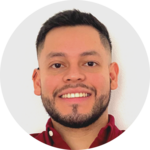
PhD Student
After obtaining his BSc in Biology at the University of Salamanca (Spain), Christian pursued an MSc in Biochemistry at the University of Geneva (Switzerland). During his MSc thesis at the Biomedical and Metabolomics Analysis Unit, he specialised in computational biology applied to biomarker annotation in untargeted metabolomics.
Christian's profound interest in bioinformatics led him to work as a bioinformatician at the Bioinformatics Support Unit at the University of Geneva. Throughout the year, he was an integral part of the team, actively contributing to various projects that expanded his expertise in data analysis, with a specific focus on proteomics, bulk, and single-cell RNA-seq.
In February 2024, Christian embarked on a new journey by joining the Kretzschmar lab as a PhD candidate, driven by his passion for computational biology and a firm commitment to cancer research. His PhD project focuses on the computational analysis of transcriptomics data, aiming to identify pivotal cancer hallmarks that enhance our understanding of the disease and ultimately improve therapeutic strategies.
Christian's project is funded by the European Union/ERC and the Stiftung Forschung hilft.
Lena Paschmanns
MSc Student
After obtaining her Bachelor's degree in Biomedicine, Lena continued her studies at the University of Würzburg. In October 2024, she joined the Kretzschmar group to undertake an internship and complete her Master’s thesis.
Lena's project aims to identify new stem cell markers in the oral mucosa of adult mice using histology, genetic lineage tracing, organoid culture, and flow cytometry analysis.
Lena's project is funded by the European Union/ERC.
Anna Seubert
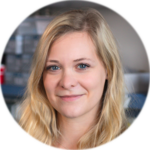
Postdoc
Anna studied biochemistry at the University of Würzburg and joined the Kretzschmar group as a PhD student in September 2020. Since defending her thesis in April 2025, Anna has been a postdoctoral researcher in the lab.
Anna's PhD project is focused on the homeostasis of the oral mucosa and the processes underlying tumour formation. To gain further insights, she is using 3D whole-mount imaging, organoid technology and advanced transcriptomics.
Anna's project is funded by the European Union/ERC.
Lili Szabó
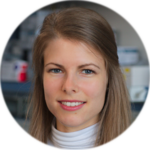
PhD Student
Lili studied Biology at Eötvös Loránd University in Budapest, where she conducted her Master's project on the characterisation of the role of extracellular proteins in the tumour microenvironment. Since September 2020, she has been a PhD student in the Kretzschmar group.
Lili's PhD project is focused on the crosstalk between tumour cells and their cellular microenvironment in head and neck cancer. To better understand this cell–cell communication, she is applying innovative methods, including organoid technology, immune cell–organoid co-cultures, and single-cell transcriptomics.
Lili's project is funded by the German Cancer Aid and the IZKF.
Dinah Weiß

MSc Student
You?

We are always looking for enthusiastic and highly motivated students (BSc or MSc level), doctoral students (PhD or MD), and postdocs. If you have a particular interest in our research field, please contact Dr Kretzschmar to discuss possible opportunities.
We are currently seeking PhD students to join a DFG Transregional Collaborative Research Centre (CRC/TRR 425 DEFINE) consortium project on desmosome regulation in organoid models of mucosal and epidermal barrier dysfunction. Please click here for more information on the project (A05). Please apply here by 31 January 2026.
A must-read for students planning to apply for a position in the lab:
How to Pick a Graduate Advisor
Two more articles worth a read are the following:
Funding
We are grateful for current and past funding from the German Cancer Aid, the European Research Council, the German Research Foundation, the IZKF Würzburg, the Graduate School of Life Sciences Würzburg, the Single-Cell Centre Würzburg, the Stiftung Tumorforschung Kopf-Hals, Forschung hilft!, EMBO, the Human Frontiers Science Program and the Dutch Research Council (NWO).
You can find us here:
Institute for Virology and Immunobiology
MSNZ
Versbacher Str. 7
D-97078 Würzburg






